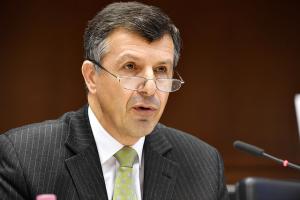Making access to EU Funds simpler – local and regional politicians outline reforms needed for more effective European Structural Investment post-2020
"Bold simplification putting local and regional beneficiaries at the heart of the post-2020 structural investments will help ensure that the European Union's next long-term budget better responds to the challenges facing regions and cities", said Oldřich Vlasák, rapporteur for the opinion on the final conclusions and recommendations of the High Level Group on Simplification for post-2020, adopted by the European Committee of the Regions on 1 February 2018.
The recommendations adopted by the CoR bring a local and regional perspective to the European Commission's efforts to simplify access to EU Funds in the post-2020 budget, on February 1. While welcoming the conclusions of the European Commission's High Level Group (HLG) on Simplification of European Structural Investment Funds, the CoR has emphasised that there are a number of very important areas that could be reinforced or addressed in addition to the HLG's recommendations. One such area is the need for a stronger bottom-up approach so that local and regional authorities are treated as equal partners in the development of programmes, with the partnership principle being more deeply rooted in the future legal framework of the European Structural and Investment (ESI) Funds.

The Committee expresses in its opinion its strong support for the significant benefits of the shared management model of Funds so that they are managed at national level for the effective delivery of Cohesion Policy. Local and regional authorities are the main stakeholders for the delivery of the Cohesion Policy and as such they need to be fully involved at all stages of the negotiation and implementation process. We believe that that only the shared management model enables sufficient recognition of regional specificities and has a positive impact on other policy areas beyond ESIF, such as reinforcing good governance and civic engagement.
The CoR has also underlined the need for bolder action to cut red-tape. EU Funds should be delivered wherever possible via existing national, regional and local administrative mechanisms. National, regional and local rules and systems (including national auditing authorities and national competition authorities) should be used and relied on wherever possible, because the simplest rules are those that are few in number and preferably the same as those already applied in the Member States. The proposed approach would enable significant simplification with regard to audit, control and reporting. The CoR calls for more proportionality in terms of the number of controls and reporting requirements and for the error margin to be adjusted from 3% to 5%. The control system applied at present, which goes beyond the requirements of internationally recognised standards, creates the misleading perception that the current model is unduly prone to errors. Greater proportionality could also be achieved by moving towards a more differentiated approach in the areas of audit and reporting, taking due account of proven past reliability of national systems and enabling more flexibility to accommodate existing national checks and procedures.
The CoR opinion was drafted under the leadership of Oldřich Vlasák (Councillor for the City of Hradec Králové, Czech Republic / Vice-President of the ECR Group) , who said: "Achieving cohesive development in Europe so that our poorer regions prosper and grow with the rest of the continent is crucial for our future. Strategic investments such as the EU's Cohesion Policy is an important tool in helping achieve this but the complexity and top-down approach has meant that the policy and Funds have not achieved their full potential. We need bold steps to simplify the way we invest in and support our cities and regions. We need to work with local and regional authorities more and support them rather than trying to lead or micro-manage them. We need to also develop a single rulebook for Funds with a territorial angle and use national controls, audits and reporting more rather than creating layers and layers of bureaucracy."
The opinion also supports the call for a level playing field between ESI Funds and centrally managed funds. Compatibility and optimisation of different sources of funding will be even more essential post-2020 than it is now. Effective combination of ESI Funds with financial instruments will continue to be an important option for local and regional authorities. That is why the CoR suggests the creation of one stop shops at national or regional level to help beneficiaries handle ESI and non-ESI Funds together. Simplifying the implementation of Cohesion Policy is an objective frequently raised by all actors involved in the management of the ESI Funds. The simplification process enables lessons to be learned from practical experience on the ground and contributes to a better, more effective and simpler use of the Funds, for the greatest possible contribution to achieving the Treaty objective of territorial cohesion and making the EU more competitive.
Source: European Committee of the Regions
- 306 reads
Human Rights
Fostering a More Humane World: The 28th Eurasian Economic Summi

Conscience, Hope, and Action: Keys to Global Peace and Sustainability

Ringing FOWPAL’s Peace Bell for the World:Nobel Peace Prize Laureates’ Visions and Actions

Protecting the World’s Cultural Diversity for a Sustainable Future

Puppet Show I International Friendship Day 2020

